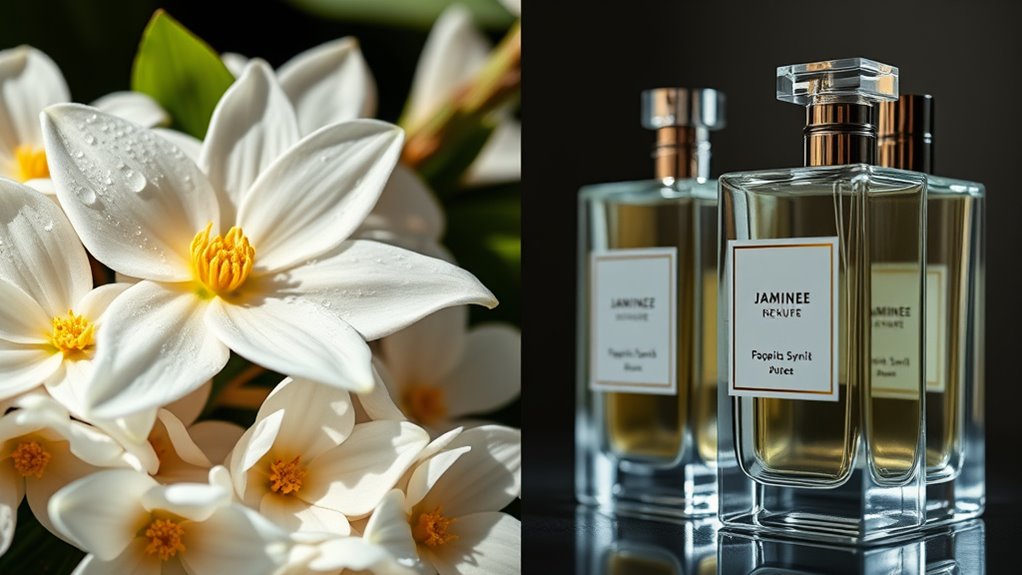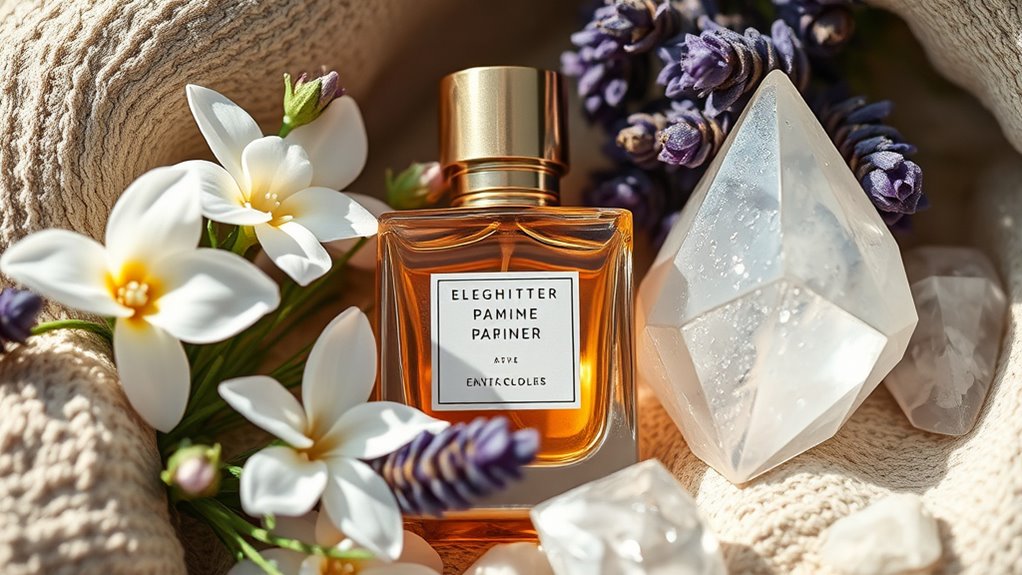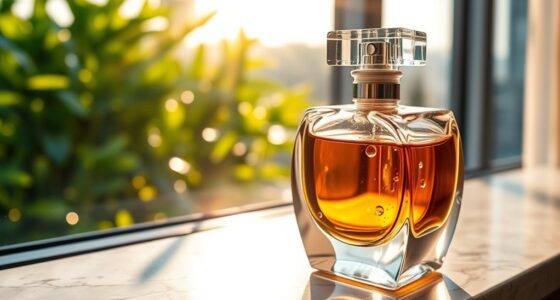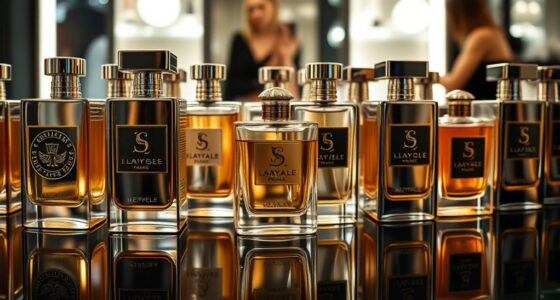In luxury perfume, choosing between natural and synthetic ingredients impacts scent, longevity, and sustainability. Natural oils offer nuanced, authentic aromas but tend to fade faster and can be environmentally challenging if sourced irresponsibly. Synthetic ingredients provide longer-lasting, stable fragrances and can be created sustainably, reducing harm to wild plants. Many brands blend both for balanced, eco-conscious scents that appeal to your values and preferences. To explore how these choices shape your fragrance experience, keep exploring further insights.
Key Takeaways
- Natural ingredients offer authentic, nuanced scents but tend to be less stable and fade faster than synthetics.
- Synthetic ingredients provide consistent, longer-lasting fragrances, enabling complex scent creation not possible with natural sources.
- Combining natural and synthetic ingredients allows perfumers to balance authenticity, durability, and eco-consciousness.
- The sustainability debate centers on natural ingredient overharvesting versus responsible synthetic production.
- Luxury perfumers prioritize artistry and innovation by blending both ingredient types to craft unique, high-quality scents.

When choosing a luxury perfume, you might wonder whether natural or synthetic ingredients create a better scent. This question goes beyond personal preference and taps into larger conversations about the sustainability debate and scent longevity. Natural ingredients, like essential oils from flowers, fruits, and herbs, are often celebrated for their purity and connection to nature. However, they can be limited in availability, and their extraction sometimes raises concerns about environmental impact. Synthetic ingredients, on the other hand, are crafted in laboratories, allowing perfumers to recreate rare or delicate scents that might be difficult to source naturally. They often come with a lower environmental footprint, especially when produced responsibly, and they offer consistency in scent quality.
When considering sustainability, synthetic ingredients can seem like the more eco-friendly choice, especially if they reduce the need for overharvesting wild plants and flowers. Natural ingredients, while appealing for their authenticity, can contribute to overexploitation and habitat destruction if not sourced ethically. The sustainability debate becomes particularly relevant if you value eco-conscious products and want to support environmentally responsible brands. Many luxury perfume houses now focus on sustainable practices, whether by sourcing ingredients ethically or developing synthetic alternatives that are biodegradable and less resource-intensive.
Scent longevity is another critical factor influencing your choice. Natural ingredients often have a softer, more nuanced aroma, but they may not last as long on the skin. The volatile nature of natural oils means their scent can fade faster, requiring reapplication to maintain the fragrance throughout the day. Synthetic ingredients, however, tend to be more stable, allowing for a longer-lasting scent that retains its original character for hours. This is especially valuable if you prefer a perfume that stays vibrant from morning to night without frequent touch-ups.
Additionally, advances in sustainable perfumery have led to innovative methods of creating high-quality fragrances that combine natural and synthetic ingredients responsibly, offering a wider range of options for eco-conscious consumers. Ultimately, your decision hinges on what matters most to you: the authenticity and complexity of natural ingredients or the durability and consistency of synthetics. Some luxury brands blend both to achieve a balanced scent profile that benefits from the best of both worlds. While natural ingredients may appeal to your sense of purity and eco-consciousness, synthetics can provide the long-lasting power and versatility you desire. As you explore options, keep in mind that the quality of the perfume depends not just on the ingredients but also on the artistry of the perfumer. Whichever route you choose, the perfect fragrance is about aligning with your values and preferences.
Frequently Asked Questions
How Do Natural and Synthetic Ingredients Affect Scent Longevity?
Natural ingredients often have less stability, which can lead to shorter scent longevity, while synthetic ingredients tend to be more stable, enhancing scent projection and lasting longer. You’ll notice natural notes may fade quicker but offer a more authentic feel, whereas synthetic components provide consistent intensity over time. By understanding ingredient stability, you can choose perfumes that match your desired longevity and scent projection, ensuring your fragrance stays enthralling throughout the day.
Are Synthetic Fragrances More Environmentally Sustainable Than Natural Ones?
You might think synthetic fragrances are greener, but the eco-friendliness debate isn’t that cut and dry. While synthetics often have a smaller supply chain impact and can be produced more sustainably, they can also contribute to environmental issues if not managed responsibly. Natural ingredients might seem more eco-friendly, but harvesting them can harm ecosystems. Ultimately, it’s about balancing production practices and sustainability efforts to make the best choice.
Can Synthetic Perfumes Mimic Rare Natural Ingredients Accurately?
Yes, synthetic perfumes can mimic rare natural ingredients accurately through advanced synthetic mimicry techniques. You’ll find that ingredient authenticity is often achieved with lab-created compounds that replicate complex scent profiles, making it possible to enjoy the same olfactory experience. This allows perfumers to craft luxurious fragrances without relying solely on scarce or ethically challenging natural sources, ensuring consistent quality while maintaining the essence of rare ingredients.
Do Natural Perfumes Have a Higher Risk of Allergic Reactions?
You should know that natural perfumes do have a higher allergy prevalence because they contain raw, unprocessed ingredients that can carry impurities or unpredictable compounds. While they often boast ingredient purity, natural extracts might trigger sensitivities more easily than synthetics. If you have sensitive skin, it’s wise to do a patch test, as natural ingredients can sometimes provoke allergic reactions despite their purity.
How Does the Production Cost Compare Between Natural and Synthetic Perfumes?
Production costs for natural perfumes tend to be higher than synthetic ones due to the expense of ingredient sourcing, labor-intensive extraction processes, and limited availability of raw materials. Synthetic perfumes often benefit from more affordable ingredients and streamlined manufacturing. You’ll notice that natural fragrances usually come with a premium price, reflecting these higher production costs, while synthetics offer a cost-effective alternative without compromising on scent complexity.
Conclusion
Ultimately, whether you prefer the warm glow of natural scents or the vibrant sparkle of synthetic notes, each offers a unique symphony for your senses. Think of natural ingredients as whispers from nature’s heart, while synthetics are bold artists painting vivid olfactory landscapes. Your choice shapes your signature story—like a signature brushstroke on a canvas. Embrace what resonates, and let your perfume be the melody that echoes your essence for all to hear.









